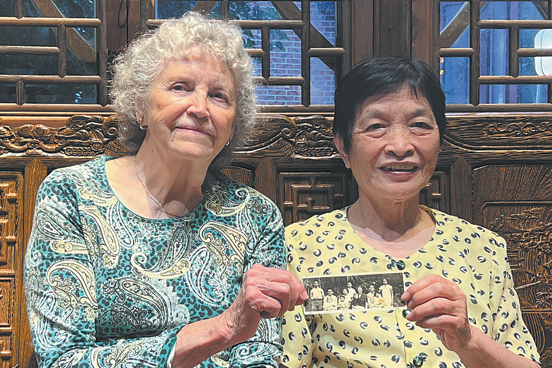Graduates struggle to gain foothold in capital
By Wang Xiaoyu | China Daily | Updated: 2019-01-15 09:13
Darkest moments
Chang Jinjin, 23, entry-level job at a real estate company
Rents one room (12 sq m) in a three-bedroom apartment in Chaoyang district for 2,600 yuan a month
Earns 5,000 yuan a month
Chang Jinjin has moved about seven times in Beijing since graduating from a college in Shijiazhuang, the capital of northern China's Hebei province, in the middle of 2017.
During her most desperate moments, she braved biting gusts of wind on several evenings in December to look for a new place to live. The partitioned room where she had been staying was demolished after 19 people died in a blaze in Daxing district that prompted a citywide inspection to eliminate fire hazards in apartment buildings.
"The rental company delivered an ultimatum in a text message, saying that my room would be 'smashed down' in two days," Chang said.
She was one of many who had to move out and find a new room at short notice.
"I deposited my suitcase at my friend's home, and got off at each stop on Subway Line 10 to inquire at agencies in different locations," Chang said. "No rooms were available. All the agency staff flatly turned me down.
"A staff member told me that he himself was scrambling for a room at that time. Newly listed rooms on the rental app were leased out in a split second."
Chang had no choice but to try her luck by visiting every bricks-and-mortar agency she could find while constantly refreshing the pages of rental apps and forums.
Before December, she had already moved several times. She squeezed into a bunk bed in a room shared with three strangers, was cheated by illegitimate agents and fake loan plans, and for one month spent five hours commuting each day.
But at least she had a place to stay and sleep at night.
"I was ambitious and keen to advance my career when I first arrived here," Chang said. "Months of moving around wore out my spirit and body."
The desperate episode in December ended with a sudden call from an agent who said a landlord had just posted a room online. Chang didn't hesitate for a second before accepting the offer.
"I am proud to say I never complained to my parents, even in the darkest moments," she said. "I take the responsibility for my decision to stay in Beijing, and honestly, my family is unable to lend a helping hand as they're miles away."
Her financial prospects have now improved, with a year's hard work at her foreign-funded employer leading to a pay rise.
"Despite all the hardship, I am feeling upbeat now," Chang said. "Pessimism doesn't lead to a solution. I will be working hard to tackle any issues standing in my way."
Toxic chemicals
Zhang Yuedong, 24, new media editor for Caijing.com
Rents one room (11 sq m) in a three-bedroom apartment in Chaoyang district with 3,100 yuan a month
Earns 7,000 yuan a month
The weight of a monthslong lawsuit was the last thing Zhang Yuedong was thinking about when he signed a contract with apartment rental app Ziroom in July for an apartment he has since left.
But then he began coughing repeatedly and his nose wouldn't stop bleeding during staff meetings. And then Ziroom accused him of faking air inspection records.
Four months later, he is among a group of about 100 people across China who have filed, or are planning to file, lawsuits against Ziroom.
Zhang and the others found themselves developing rashes, nosebleeds and sore throats after moving into apartments rented through Ziroom. Tests of the indoor air quality in their dwellings indicated unhealthy levels of toxic chemicals, including formaldehyde, a potential carcinogen.
Zhang finished his bachelor's degree in Shenyang, capital of northeastern China's Liaoning province, in 2017, and then worked briefly in Shanghai before moving to Beijing in July.
"The agent from Ziroom told me the room had been recently refurbished, and all construction work conformed to the national standards," he said. "But the testing paper I used - showing three times more toxic chemicals accumulated in the room than normal - told a different story."
Later tests from professional air inspection companies also indicated high levels of formaldehyde.
Zhang contacted Ziroom in early September, asking for an official apology, a refund of the deposit and rent he had paid, and compensation for his removal costs.
"They proposed to conduct another round of air inspection in mid-September," he said. "And they stood me up after making an appointment with me.
"On Sept 26, two regional managers showed up holding an agreement with a liability waiver attached. No way in the world would I sign such a shameless document."
In response to the wider air quality controversy, Ziroom said on Sept 11 that newly refurbished apartments would be left vacant for at least 30 days and would have to pass tests for indoor air quality before being listed, beginning from Sept 24.
Zhang studied winemaking in college, and is now working for a media company as an editor focused on wine-related topics.
A lack of a background in law didn't stop him from confronting a successful startup company in the rental business.
"I am running a micro blog account, posting and forwarding posts related to air safety issues in rental apartments," Zhang said.
He is also providing advice to renters who encounter high levels of toxic chemicals in their apartments. Together, they have hired a few lawyers to handle their cases.
"It is daunting work, in addition to my daily job assignments, but it's urgent and important to draw attention to the harmful operations of rental companies," Zhang said.
























